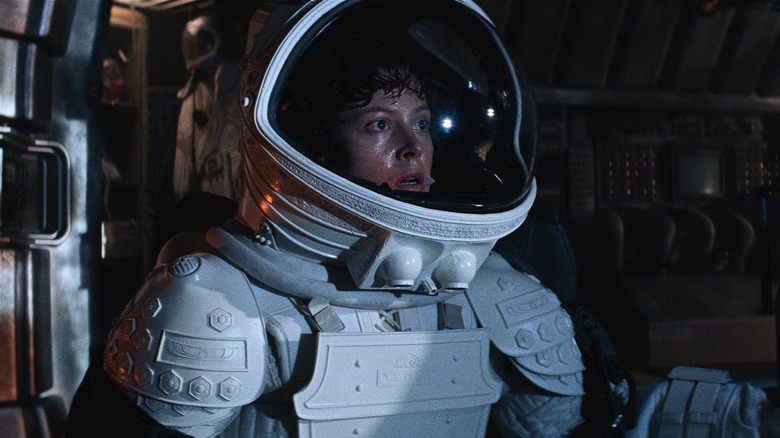Ranking The Alien Movies By Box Office
They say in space, no one can hear you scream. On Earth, though, you can easily hear people talking about how much they love the "Alien" movies. There's a reason this franchise has kept churning out new installments like 2024's "Alien: Romulus" since 1979. Moviegoers around the globe can't get enough of those slimy Xenomorphs and heroic franchise fixtures like Ellen Ripley (Sigourney Weaver).
It doesn't hurt that each installment's varying aesthetics ensures that the "Alien" franchise caters to many different tastes. The reserved horror atmosphere of "Alien," for instance, is much different from the modern PG-13 thrills of "Alien vs. Predator." There's a versatility to the "Alien" saga that extends to so many aspects of these movies. Another wildly malleable element within the series? The box office performances of its various installments.
Over nearly 50 years, the assorted "Alien" titles have had wide-ranging box office outcomes. Some were grave disappointments, some did just fine, while still others were huge hits that forever changed Hollywood. Ranking the "Alien" movies from lowest to highest grossing at the worldwide box office (as well as analyzing the significance of the franchise's box office trajectory) makes it clear how many different financial outcomes the "Alien" saga has produced. A flop can be followed by a massive hit. Even at its financial nadir, however, the franchise has never extinguished people's passion for these movies. Like one of those relentless Xenomorphs, the "Alien" movies keep on surviving and surprising people.
9. Alien vs. Predator: Requiem
"Alien vs. Predator: Requiem" was always going to be at a disadvantage at the box office. The novelty of seeing the "Alien" and "Predator" beasties fighting had already worn off with its 2004 predecessor, "Alien vs. Predator." Even shifting the action to a populated Earth city wasn't inherently a fresh gimmick. After all, the original "Alien vs. Predator" also took place on the same planet, only in the Arctic. Without any big names in the cast or enticing connections to the beloved 20th century "Alien" and "Predator" movies, there was really nothing to drum up hype for 2007's "Requiem."
Initially, it didn't look like "Requiem" would be a total box office cataclysm, thanks to a $9.5 million domestic opening day. While not a record-shattering bow, that was enough to make it the third-biggest movie in America in a crowded marketplace. However, this Christmas Day newcomer quickly fell off a cliff, only drumming up $41.7 million domestically, making it the only "Alien" movie to date to earn less than $45 million in North America. Worldwide, "Requiem" fared much better with a $128.8 million haul. On a $40 million budget (almost half the budget of "Alien vs. Predator"), "Requiem" technically turned a profit. But its North American sum meant it was game over for any more crossovers for the "Alien" saga. Making people care twice about a war where "whoever wins, we lose" was a battle "Requiem" couldn't win.
8. Alien 3
One "Alien" sequel had gone over like gangbusters, so why not try another? "Alien 3" arrived in theaters over Memorial Day weekend of 1992 with high hopes of replicating its predecessors' incredible box office successes. This time, director David Fincher took the franchise to a prison planet and delivered bold narrative maneuvers such as killing off beloved "Aliens" characters like Newt. James Cameron's "Aliens" was often a brutally intense movie, but it also ended triumphantly with Ripley and Newt getting away from all those Xenomorphs. "Alien 3" was a grimmer, more muted affair that concluded with Ripley sacrificing herself. Trying to turn this material into a feel-good summer blockbuster was always going to be challenging — in fact, "Alien 3" almost didn't get released.
"Alien 3" scored the fifth-biggest domestic opening weekend of 1992, clearly indicating that this project arrived in theaters with enough goodwill to tee it up for a leggy run across that year's hottest months. However, it plummeted afterward thanks to disastrous word-of-mouth, and only grossed $54.9 million in North America. That was a substantial decrease from the domestic hauls of the previous "Alien" movies even without accounting for inflation. Overseas, the film grossed a robust $103.5 million for a $158.5 million global haul, which meant the $55 million title barely broke even in theaters. However, given that "Aliens" had done roughly 11 times its budget worldwide just six years earlier, 20th Century Fox had to have hoped for more when it came to "Alien 3."
7. Alien: Resurrection
As Jason Voorhees, Han Lue, or Jon Snow can attest, death is not the end for a character audiences love enough. So it was with Sigourney Weaver's Ellen Ripley, who very explicitly perished in the downer ending of "Alien 3." However, this pop culture icon still returned to the big screen with "Alien: Resurrection" five years later through the magic of cloning. This Ripley wasn't just an ordinary human, but a scientific creation that had Xenomorph DNA in her genetic code — the ultimate alien hunter had become part alien herself.
This installment also paired Ripley up with actors like Ron Perlman and Winona Ryder in a production intended to restore the "Alien" franchise to its pre-1992 box office glory. Unlike the three previous installments, 1997's "Resurrection" opened over Thanksgiving weekend rather than Memorial Day. This decision resulted in a $16.4 million domestic opening weekend and a $47.8 million lifetime gross in North America. That frontloaded run was no surprise: "Alien: Resurrection" had no chance of sticking around long-term at the box office, thanks to competition from December 1997 heavyweights like "Scream 2" and a new film from "Aliens" filmmaker James Cameron called "Titanic."
Per usual for a domestically underperforming "Alien" installment, "Alien: Resurrection" made up financial ground overseas. Thanks to international moviegoers, "Resurrection" eventually grossed $160.7 million, narrowly ahead of the final worldwide gross for "Alien 3." But even that feat wasn't enough to erase the disappointing aura hovering around the box office run of "Alien: Resurrection."
6. Alien vs. Predator
In 2005, eventual "Batman v Superman: Dawn of Justice" screenwriter David S. Goyer openly declared that a movie about Batman and Superman fighting was a terrible idea. For Goyer, pitting beloved pop culture icons against one another signaled creative inertia and studio executive desperation. What sounded like a nightmare to Goyer circa 2005 was music to the ears of 20th Century Fox executives at the dawn of the 21st century, as they green-lit "Alien vs. Predator," a crossover meant to rejuvenate both the "Alien" and "Predator" franchises. Ripley had been taken as far as she could go ... why not have the Xenomorph duke it out with another famous extraterrestrial?
Seeing these two beasties collide for the first time proved irresistible to moviegoers. In its domestic run alone, "Alien vs. Predator" grossed $80.2 million, which is still (as of this writing) the third-biggest gross ever for an "Alien" movie. Surprisingly, "Alien vs. Predator" did a bit worse overseas than the two 1990s "Alien" movies. Even with that caveat, this Paul W.S. Anderson feature had no trouble accumulating $172.5 million worldwide.
Sometimes, it's no surprise why a movie crushes it at the box office. Promising moviegoers both "Alien" and "Predator" carnage was more than enough to get people excited and light up the box office. What sounded trite to Goyer was a minor goldmine for the "Alien" saga.
5. Aliens
Believe it or not, there was a time when not every James Cameron movie automatically cracked $2 billion or more at the worldwide box office. This arcane age saw Cameron kick off his post-"Piranha II: The Spawning" directorial career in 1984 with the $78.3 million worldwide haul of "The Terminator." That sleeper sci-fi hit led to Cameron getting the keys to the "Alien" saga, with the proceedings centered more this time on action than slow-burn horror. But Cameron wasn't the only relatively untested element at play with "Aliens." Execs at Fox were not even sure that they wanted to make a sequel to the original "Alien," especially one costing so much more to make than its predecessor.
It turned out there was no reason to worry about it: "Aliens" grossed a massive $183.2 million worldwide upon its release in July 1986, including a gigantic $85.1 million in North America alone. "Aliens" was the seventh-biggest movie of 1986 domestically and the third-biggest of the year globally. Goodwill from the initial "Alien" installment clearly helped, but the follow-up's excellent word-of-mouth ensured that "Aliens" was consistently one of the five biggest movies in America every weekend through Labor Day 1986. With this smashing success, "Alien" was officially a franchise and James Cameron had scored his first worldwide mega-hit. It would not be his last.
4. Alien
The "Alien" saga is now so deeply entrenched in American pop culture that it's difficult to imagine any point in history where it wasn't in our lives. However, back in 1979, "Alien" was very much an unknown quantity at the box office. Even with "Star Wars" becoming such a huge box office phenomenon in 1977, uncertainty loomed over "Alien" and the sci-fi genre's viability as a whole. Those doubts quickly vanished once "Alien" grossed a whopping $186.9 million at the worldwide box office on just a $10.7 million budget. $64.3 million of its gross came from its domestic run, where it earned enough to become North America's ninth-biggest movie of 1979.
"Alien" was so massive that it still stands as one of the biggest non-"Ghostbusters" live-action movies in Sigourney Weaver's lengthy career. When "Alien" hit theaters, there weren't a ton of precedents for costly sci-fi/horror in the theatrical marketplace. That dearth of past hits made Fox executives nervous, but it helped "Alien" stand out to moviegoers. Here was a movie delivering a cosmic story that wasn't common on the big screen.
Offering something new, not to mention delivering the kind of restrained scares that made "Jaws" a phenomenon a few years earlier, was a recipe for box office success. With this theatrical performance, "Alien" went from an unknown wild card to a pop culture sensation, sparking a multimedia franchise that continues to this day.
3. Alien: Romulus
When it was first announced, "Alien: Romulus" was destined, like most 20th Century Studios movies since 2021, to launch on Hulu. Much like 2022's "Predator" prequel "Prey," "Alien: Romulus" was green-lit first and foremost as a way to buoy Hulu subscription numbers. Eventually, those ambitions changed and a traditional theatrical release was implemented instead. That turned out to be an incredibly smart move, since "Alien: Romulus" became a box office hit.
"Romulus" has already accumulated $231 million worldwide just a few weeks into its global box office run. That's enough to make it the third-biggest "Alien" movie ever and all but certain to shortly take over the No. 2 spot. It's also on track to become only the second "Alien" title ever to clear $100 million domestically. Horror movies have been on a massive upswing in recent years and Disney's promotional campaign for "Romulus" very much leaned into that genre. Rather than being a weighty continuation of the more cerebral "Prometheus" saga, "Romulus" was pitched to audiences more in the vein of director Fede Alvarez's "Don't Breathe."
The lingering goodwill surrounding this franchise (which took even derided installments like "Alien: Resurrection" to $150 million+ globally) didn't hurt either. Committing to a big screen launchpad instead of a Hulu premiere paid off big time for "Alien: Romulus" and continued the winning box office reputation of this saga into a new decade.
2. Alien: Covenant
Before "Prometheus" hit theaters, its creative team played coy about just how connected the film was to the larger "Alien" mythos. The "Prometheus" sequel, by contrast, was upfront about what franchise it was building on — even down to the film being called "Alien: Covenant" rather than "Prometheus 2." With a title firmly rooted in the "Alien" saga and posters putting the snarling Xenomorph front-and-center, "Alien: Covenant" was the first "Alien" solo feature marketed as such to hit theaters in nearly 20 years.
Absence sometimes makes the heart grow fonder, but even given all the time that had passed since "Alien: Resurrection," "Covenant" was no breakout hit at the box office. In its North American run, "Covenant" grossed just $74.2 million, beneath the domestic gross of "Aliens" from 31 years earlier. It was also down 41% from the lifetime domestic haul of "Prometheus." With a $238.5 million worldwide gross, "Covenant," which cost $97 million to produce, was not a tremendous money-loser, but this was still a disappointing haul. Intense May 2017 competition (namely from early May hit "Guardians of the Galaxy Vol. 2") also didn't help.
However, the biggest problem here may have been the divisive audience response to "Prometheus." Exploring more of this corner of the "Alien" mythos just didn't appeal to moviegoers. No wonder the "Alien: Romulus" marketing has emphasized connections to the original "Alien" rather than the Engineers explored in "Covenant" and its direct predecessor.
1. Prometheus
Humans have always wondered where we came from and who created us. "Prometheus" attempted to probe those queries while also tying into background lore details from the very first "Alien" movie. This audacious-sounding endeavor was helmed by original "Alien" director Ridley Scott, making his big return to the franchise after more than three decades away. Scott's return functioned, at least on a promotional level, as a reassuring element for long-time "Alien" fans. A pair of trashy "Alien vs. Predator" installments and the mixed response to the two 1990s "Alien" movies had tarnished the brand's reputation. Scott was here to put things right for the beleaguered, confusing "Alien" franchise with "Prometheus."
These elements, not to mention the striking marketing for "Prometheus," led to it hitting new box office highs for the "Alien" saga. To date, "Prometheus" is the only "Alien" installment to clear both $100 million domestically and $250 million worldwide. Its global haul soared above those records with a $402.4 million worldwide gross ($126.4 million of which came from North America).
When the dust settled on summer 2012, "Prometheus" was the season's 10th-biggest movie domestically, aided in its box office run by a marketing campaign that presented it first and foremost as an original movie. This was an accessible, star-studded horror movie anyone could watch, not just die-hard "Alien" devotees. Plus, for those obsessed with "Alien," getting Scott behind the camera again was a can't-miss proposition.
No billion dolllar grossers, no problem
The "Alien" saga is one of the longest-running ongoing film franchises, but unlike other 1960s/1970s properties still invading theaters, no single title in the series has broken any box office records. While the James Bond and "Star Wars" movies each have at least one installment that's cracked $1 billion+ worldwide, only a single "Alien" feature has narrowly crossed $400 million. Each title's individual worldwide grosses are a tad lower than you might expect for such an enduring brand. Where are the $700 million+ performers that dominate the Marvel Cinematic Universe or Wizarding World sagas?
What "Alien" has in its favor is consistency. Over nearly 50 years, an "Alien" movie is practically guaranteed to make at least $125 million worldwide. Additionally, each installment has been reliably profitable to some degree. The more modest budgets for each picture have ensured that the "Alien" saga has avoided cataclysmic misfires like "Dark Phoenix" or "Terminator: Genisys" that permanently derailed other famous film franchises.
Most intriguingly, the "Alien" movies keep cropping up as must-see attractions across each decade. These films don't need 30 or 40 years of dormancy to become events again. Even just five or six years away from multiplexes is enough to get audiences hankering again for more "Alien" movies. Sure, the financiers behind these sci-fi/horror films would love to join the $1 billion club. But the "Alien" saga has proven that steady, reliable returns can be just as good as occasional record-smashing box office juggernauts.










